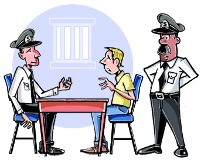5. Arrest
By end of this topic you will learn about:
- Specify why arrests are a last resort and the limitations of a door supervisor’s power of arrest
- Define an indictable offence
- Identify when a door supervisor may arrest
- State the agreed arrest procedures
- Explain the procedures to be taken following an arrest

An arrest is …
“…the taking or restraint of a person from his liberty in order that he shall be forthcoming to answer an alleged crime or offence.”
POWER of Arrest:
Door Supervisors have the same powers of arrest as any other member of the public. They do not have any extra powers of arrest. Arrest should be treated as the last resort
Changes to POWERS of Arrest:
On the 1st January 2006 the law changed in relation to the powers of arrest for members of the public.
The old ‘arrestable offences’ under the Police and Criminal Evidence Act of 1984 (PACE) have been superseded by ‘indictable offences’ under the Serious Organised Crime and Police Act of 2005. (SOCPA 2005).
NB: An ‘indictable offence’ is one that can be tried at the Crown Court.
Breach of peace …
Considered to be…
“…any disorder or disruption to the peace in public or in private that results in violence, the threat of violence or provokes violence from another”.
Indictable for members of the public under Common Law.
Section 24A SOCPA 2005
- A person other than a constable may arrest without a warrant:
a) Anyone who is in the act of committing an indictable offence;
b) Anyone whom he has reasonable grounds for suspecting to be committing an indictable offence.
2) Where an indictable offence has been committed, a person other than a constable may arrest without a warrant-
a) Anyone who is guilty of the offence;
b) Anyone whom he has reasonable grounds for suspecting to be guilty of it.
But this power of arrest is exercisable only if:
- The person making the arrest has reasonable grounds for believing that for any of reasons mentioned it is necessary to arrest the person in question;
- It appears to the person making the arrest that it is not reasonably practicable for a constable to make it instead.
The reasons are to prevent the person from:
- Causing physical injury to himself or any other person;
- Suffering physical injury
- Causing loss of or damage to property; or
- Making off before a constable can assume responsibility for him
Offences door supervisors can arrest for:
| Murder | Rape | Drugs |
| Firearms | Weapons | Burglary |
| Robbery | Theft | Deception |
| Criminal damage | Assaults | Arson |
When to Arrest
Only arrest for the following reasons:
- To prevent an offence being committed
- To prevent the continuance of an offence
- To prevent the renewal of an offence
- To detain someone for an offense already committed
Following an arrest
Door supervisor has the following responsibilities:
- You are responsible for the person’s safety
- He/she must be continually observed
- The police must be called immediately
Use of Force
Criminal Law Act, 1967 (Section 3, Para 1)
Human Rights Act, 1998 (Article 2)
Any person may use such force as is reasonable in the circumstances:
- In the prevention of crime, or
- In effecting or assisting in the lawful arrest of suspected offenders or persons at large

